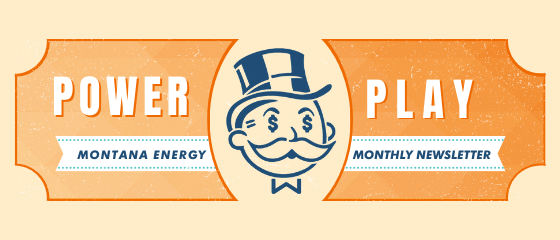
Hey, we get it. This stuff is wonky and full of jargon. We’ve tried to make the general language of Power Play as accessible as we can, but there are still some terms that could trip folks up. See below a living glossary where we will add new terms included in each issue.
Barriers to Entry: factors that can prevent or impede competitors from joining a market such as high start-up costs.
Competition: in economics, this is a situation where different entities compete for customers or resources. In markets where competition is not restricted by things like barriers to entry or limited access to information, economists predict that there will be more innovation and lower prices.
Deregulation: a ten year period in Montana history lasting from 1997 to 2007 during which the cost of power was not regulated by the Public Service Commission in a failed attempt to allow new utilities to enter the market and bring down power prices.
Emission Reductions: a measurable decrease in greenhouse gasses released into the atmosphere from an activity specified over a period of time.
Fossil Fuels: materials made of ancient plant matter preserved in the earth’s crust that, when burned, are depleted to produce energy. Carbon dioxide is the main by-product of this reaction and causes global warming when released into the atmosphere. Examples of fossil fuels include coal, petroleum, and natural gas.
Free Market: an economic system in which prices for goods and services are determined by unrestricted competition between businesses and transactions are “free” from government intervention.
Monopoly: a business, company, or corporation that does not have to compete to provide a needed good or service to a captive customer base.
NorthWestern Energy: an electricity and gas utility monopoly based in South Dakota that currently supplies power to two-thirds of Montana’s energy consumers.
Montana Power Company: a collapsed utility monopoly that provided power to the majority of Montana for nearly a century until it sold all its assets and converted to a telecommunications company in 1999.
Net Metering: a billing mechanism that allows a home, business, school, or library with a distributed generation system to accrue on-bill credits for excess energy that their system exports to the grid. Credits can be ‘banked’ for future bills. In most cases, the ‘bank’ balance resets to zero once per year and any leftover credits are forfeited to the utility (source: MREA)
Pennsylvania Power and Light: A Pennsylvania-based utility that bought the majority of Montana Power Company’s assets in 1999. It supplied energy to Montana for 15 years before selling those same assets to NorthWestern Energy in 2014.
Pre-Approval: A Montana law passed in 2003 that allows NWE to be reimbursed from ratepayers for building new energy generation assets – making investments in new assets risk-free for NWE. The PSC must approve this reimbursement before the asset is built. This law was recently deemed unconstitutional by a Missoula County district court.
Procurement Plan: A plan that NWE develops every 2 to 3 years for how it will ensure a reliable and affordable supply of electricity for all ratepayers over a forecasted 20-year period.
Public Service Commission (PSC): a five-member, partisan commission that acts as a mediator between utility monopolies and us, the rate payers. They are supposed to ensure we don’t get overcharged by utilities while allowing those utilities to make enough money to incentivize stable and reliable service. The PSC’s jurisdiction includes privately-owned electricity, gas, telephone, water, garbage, and sewer utilities as well as rail and pipeline safety in Montana.
Rate Payer: likely you! Anyone who pays regularly for a utility service like electricity or gas.
Renewable Energy: often referred to as clean or sustainable energy — energy from a source that is not depleted when used, such as wind, solar, hydroelectric, and geothermal power.
Renewable Energy Standard: A Montana law passed in 2008 requiring public utilities acquire renewable energy equal to 5% of its retail sales of electricity in Montana. In 2010 that percent increased to 10% then rose to 15% in 2015. A stipulation of this law required utilities that did not comply to pay a penalty fee to tribal and low income energy assistance programs. This law was largely ignored by NWE and then was eliminated (along with the standing debt) in the 2021 legislative session.
Re-Regulation: a period in history when the Montana Legislature re-instated regulations for the production of power beginning in 2007 and lasting through the present day.
Rooftop Solar: A small-scale energy generation system where solar panels are mounted on the roof of a residential or commercial building. The system is generally owned by the resident or business.
TouchAmerica: a telecommunications company that Montana Power Company restructured itself into in 2001, which then went bankrupt in 2003.
Utility: an organization that supplies a community with goods or services that are considered essential such as water, gas, electricity, or telephone.
